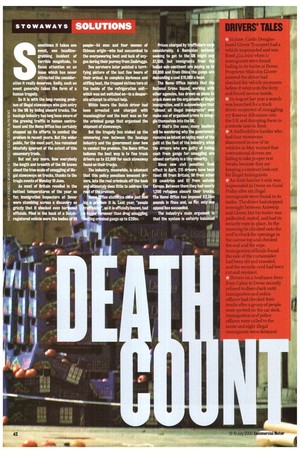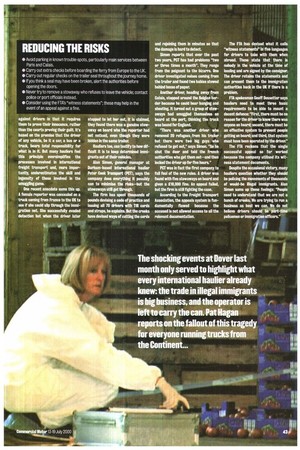S ometimes it takes one event, one headlinegrabbing incident of terrible
Page 44

Page 45

If you've noticed an error in this article please click here to report it so we can fix it.
magnitude, to focus attention on an issue which has never attracted the consideration it really deserves. Sadly, such an event generally takes the form of a human tragedy.
So it is with the long-running problem of illegal stowaways who gain entry to the UK by hiding aboard trucks. The haulage industry has long been aware of the growing traffic in human contraband and the Home Office has certainly stepped up its efforts to combat the problem in recent years. But the wider public, for the most part, has remained blissfully ignorant of the extent of this unsavoury trade.
But not any more. Now everybody the length and breadth of the UK knows about the true scale of smuggling of illegal stowaways on trucks, thanks to the tragic events of Monday 19 June.
As most of Britain revelled In the hottest temperatures of the year so Tar, immigration inspectors at Dover were stumbling across a discovery so grizzly that it shocked even hardened officials. Piled in the back of a Dutchregistered vehicle were the bodies of 58 people-54 men and four women of Chinese origin—who had succumbed to the overpowering heat and lack of oxygen during their journey from Zeebrugge.
Two survivors later painted a terrifying picture of the last few hours of their ordeal. In complete darkness and stifling heat, the trapped victims tore at the Inside of the refrigeration unit— which was not switched on—in a desperate attempt to attract help.
Within hours the Dutch driver had been arrested and charged with manslaughter and the hunt was on for the criminal gangs that organised the shipment of stowaways.
But the tragedy has stoked up the simmering row between the haulage industry and the government over how to combat the problem. The Home Office believes the best way is to fine truck drivers up to £2,000 for each stowaway found on their trucks.
The industry, meanwhile, is adamant that this policy penalises innocent drivers, lets the real criminals off the hook and ultimately does little to address the poet of the problem.
ice statfitics show just 'few it is. Last year, ''people ', as it is officially known, had bigger mover than drug smuggling, oiling criminal gangs up to £20bn. big a
Prices charged by trail considerably. A Romanian seeking to get to the UK £1,500, but immigrants Indian sub-continent are pa £6,000 and from China the demanding a cool £15,000 a head.
The Home Office insists that National Crime Squad, we other agencies, has drawn up crack down on the organisers immigration, and it acknowl "almost all illegal immigrants" make use of organised crime to gle themselves into the UK.
If that's the case, many hauliers will be wondering why the government remains so intent on laying most of the guilt at the foot of the industry, when the drivers who are guilty of taking cash from gangs for smuggling are almost certainly in a tiny minority.
Since new civil penalties took effect in April, 215 drivers have been fined: 66 from Britain, 98 from other EU countries and 51 from outside Europe. Between them they had nearly 1,200 refugees aboard their trucks. The Home Office has imposed £2.34m pounds in fines and, so far, only one appeal has succeeded.
The industry's main argument is .1 that the system is unfairly balanced 4
against drivers in that it requires them to prove their innocence, rather than the courts proving their guilt. It's based on the premise that the driver of any vehicle, be it a car, a bus or a truck, bears total responsibility for what is in it. But many hauliers feel this principle oversimplifies the processes involved in international freight transport and, more importantly, underestimates the skill and ingenuity of those involved in the smuggling game.
One recent anecdote sums this up. A female reporter was concealed on a truck coming from France to the UK to see if she could slip through the immigration net. She successfully evaded detection but when the driver later
stopped to let her out, it is claimed, they found there was a genuine stowaway on board who the reporter had not noticed, even though they were hidden in the same trailer.
Hauliers too, can testify to how difficult it Is to keep determined immigrants out of their vehides.
Alan Simon, general manager at Durham-based international haulier Peter Cook Transport (PCT), says the company does everything it possibly can to minimise the risks—but the stowaways still get through.
The firm has spent thousands of pounds devising a code of practice and issuing all 70 drivers with TIR cords and straps, he explains. But the creaks have devised ways of cutting the cords and rejoining them in minutes so that the damage is hard to detect.
Simon reports that over the past two years, POT has had problems "two or three times a month". They range from the poignant to the bizarre. One driver investigated noises coming from the trailer and found two babies stowed behind boxes of paper.
Another driver, heading away from Calais, stopped around the Belgian border because he could hear banging and shouting. It turned out a group of stowaways had smuggled themselves on beard at the port, thinking the truck was bound for England.
"There was another driver who removed 20 refugees from his trailer but there were two big guys who refused to get out," says Simon. "Se he shut the door and told the French authorities who got them out—and then locked the driver up for five hours."
PCT was In fact the first company to fall foul of the new rules. A driver was found with five stowaways on board and given a 110,000 fine. An appeal failed, but the firm is still fighting the case.
According to the Freight Transport Association, the appeals system is fundamentally flawed because the accused is not allowed access to all the relevant documentation. The FTA has devised what it calls "witness statements" in five languages for drivers to take with them when abroad. These state that there is nobody in the vehicle at the time of loading and are signed by the consignor. The driver retains the statements and can present them to the immigration authorities back in the UK if there is a problem.
FTA spokesman Geoff Dossetter says hauliers need to meet three basic requirements to be able to mount a decent defence; "First, there must be no reason for the driver to know there was anyone on board; second, there must be an effective system to prevent people getting an board; and third, that system must have been operated by the driver:" The FTA reckons that the single successful appeal so far worked because the company utilised its witness statement documents.
Despite the occasional victory, many hauliers question whether they should be policing the movements of thousands of would-be illegal immigrants. Alan Simon sums up these feelings: "People need to understand that we are not a bunch of crooks. We are trying to run a business as best we can. We do not believe drivers should be part-time policemen or immigration officers."




































































































